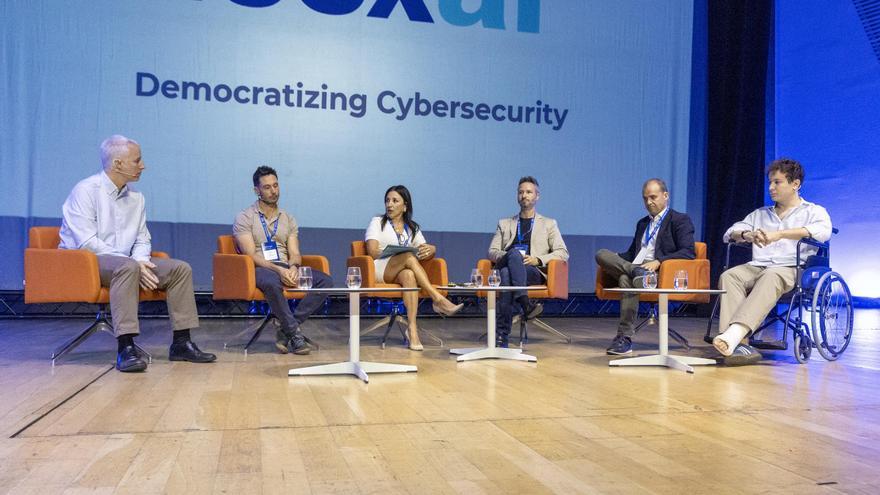
Artificial Intelligence is a strategic tool that is reconfiguring the way companies make decisions, relate to their customers and manage their teams. In this context, different experts from leading companies in technology, communication y cybersecurity have shared their vision at the round table «AI in strategic business sectors»held within the IV European Artificial Intelligence Forum.
Moderated by Eva Toledopresident of the Alicante Directors' Circle and co-CEO of Padima, the session has served to delve into the artificial intelligence in real business environments. Toledo has stressed that the AI is an opportunity for companies. For her, leadership plays an essential role: «Leadership is called to turn fear into opportunity. AI does not replace human intelligence, it amplifies it».
Toledo has placed the context: a moment of accelerated transformation in which companies must see AI not only as a efficiency tool, but as a cultural catalyst. «AI helps us detect the needs of the equipment, to guide more optimal professional careers and, above all, to have more committed people. When teams are motivated, magic happens,” he stated. And he added: «With clients, AI allows us to anticipate, detect habitsneeds and even reach predict behaviors. “It is a lever to reduce uncertainty and make more informed decisions.”
But not everything is opportunity. Toledo has also put on the table the challenges that accompany the technological revolution: ethics, talent, regulation and risk. «Companies have the responsibility to train and reorient the people whose positions will be transformed. AND We must not let AI make us lose our essence: creativity and emotion are still human.
«Leadership is called to turn fear into opportunity. “AI does not replace human intelligence, it amplifies it”
AI as corporate DNA
The session started with a direct question from the moderator: What role does AI play in your organizations? José Luis Sánchez-Ocañafounder and CTO of Alex AIis clear: «In our company AI is not just another toolis imbibed from birth. Our system analyzes millions of attacks in real time using machine learning algorithms. It is a real digital immune system that prevents attacks before they happen.” His goal, he said, is to “break the barrier to entry for companies and make cybersecurity accessible.”
«The goal of Aleex AI is to break the entry barrier for companies and make cybersecurity more accessible»
Besides, Luis Hidalgo Pérezdirector of data science at ReR and Prensa Ibéricaexplained how data has become the axis of transformation. «At Prensa Ibérica we handle more than 25 publications and 24 million unique users per month. Facing that volume has made us data management experts. AI is the last step in digital maturity ladder. Our value is in helping to build that ladder so that other companies can get the most out of their data,” he noted.
The key, Hidalgo added, is to refine and segment. «Without data there is no informationand without information there are no decisions. But to get to that point you need tools, process capacity and people with the right skills.”
«Our value is in helping companies build that ladder and realize the full potential of their data»
Digital fraud and security: a race against time
In the area of cybersecurityartificial intelligence has also marked a before and after. Javier BarrachinaR&D director of Facephi, recalled that “every time we have more access to digital servicesand that comfort brings with it new risks. In Facephi fraud reports it is estimated that this year there will be More than $10 trillion in cybercrime scams». In this sense, Facephi's mission is to reduce these figures, especially those related to identity theft, through AI techniques. «From the beginning we have had AI at the center, and thanks to that we have been able anticipate new forms of fraud», indicated Barrachina.
«Setting up an AI project is relatively simple; “The difficult thing is knowing where to put the investment and the emphasis.”
One of the biggest challenges is the «democratization of fraud», where anyone can access sophisticated tools to commit crimes. «Fraud as a service has multiplied tenfold in Spain. The regulationIn this sense, it is positivewhy establishes an ethical and trustworthy framework».
Facephi works on layered security scenarios and tools ranging from facial recognition to behavioral biometricscapable of detecting if whoever is behind a camera is really who they say they are. «Between 2 and 5% of the world's GDP moves in laundered money, and in many cases through 'mule' accounts. Users are not aware that they encourage this. Therefore, artificial intelligence must be used to understand fraud holistically and anticipate its new mutations.
Daniel López Buendía, Fortinet's SecOps Sales Specialist has been forceful: «AI is already a new battlefield. It's a weapon and a superpower, and cybercriminals are using it as part of their weaponry. He spoke of the “industrialization of digital crime» and how the only effective response is use the same technology to defend yourself. «At Fortinet we incorporate machine learning and predictive models to combat threats before they escalate. But the paradigm shift comes with the generative AI“Now companies can internalize it to apply preventive controls and strengthen their security from within.”
«It is time to establish good AI governance policies and promote a responsible culture»
López Buendía has stressed that the 100% of SMEs already use some form of AI. «This has generated a certain data use psychosisbut it is an opportunity to establish AI governance policies. Just as we talk about cybersecurity culture, we need a responsible artificial intelligence culture».
Data as fuel
From the group The Oranges, Ruben Marzal, IA & Data Specialist, has argued that the great challenge is “separating the wheat from the chaff.” «Setting up an AI project is relatively simple; In a few weeks you can have something working. The difficult thing is knowing where to put the investment and the emphasis».
MasOrange has more than 300 data and artificial intelligence specialistsand its mission is to transfer these solutions to companies, helping them to build your own models. “The key is to analyze where AI can really generate value.”
Along the same lines, Luís Hidalgo, from ReR, has expanded the focus towards data spaces, a concept promoted by the European Union that seeks facilitate the exchange of information securely. «It is about breaking down barriers without the data leaving the perimeter of the owning company. The Data spaces allow segments of information to be exchanged in a decentralized manner, complying with the trust and privacy requirements. It is a step towards the democratization of access to data», he explained.
«From the beginning at Facephi we have had AI at the center, and we have been able to anticipate new forms of fraud»
Opportunity for SMEs
Experts have agreed that this is a key moment for SMEs in the province take the jump Hidalgo recalled that there are calls for aid from the Ministry that “cover the data access costs and AI solutions», which makes the present «a magnificent opportunity to take the first steps».
Marzal has insisted that “many processes can be easily automatedespecially with the paradigm shift that has brought generative AI». Barrachina has added an optimistic message: «In Alicante there are talent, opportunities and tools. “It's the best time in history to do it.”
From FortinetLópez Buendía has defended that «AI is not coming to replace, but to empower IT departments and strengthen security of organizations. And Sánchez-Ocaña closed with a practical reflection: «We do not have to fear being replaced by AI, but learn to use it to be more efficient».
The session left a unanimous conclusion: artificial intelligence has ceased to be an experimental territory and has become a strategic resource. Companies that know integrate it with purpose and ethics They will obtain competitive advantages that are difficult to match.
For him Alicante business fabric —dynamic, innovative and increasingly digitalized—, the challenge is not technological, but cultural. AI can analyze data, anticipate risks, and predict behavior, but only leaders with vision will be able to turn those advances into sustainable growth. As Eva Toledo has highlighted, «AI can accompany us, but only people have creativity and emotion».
